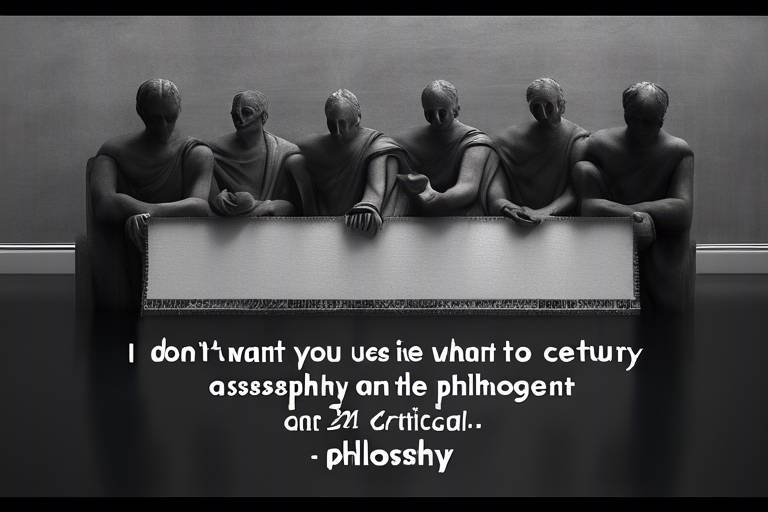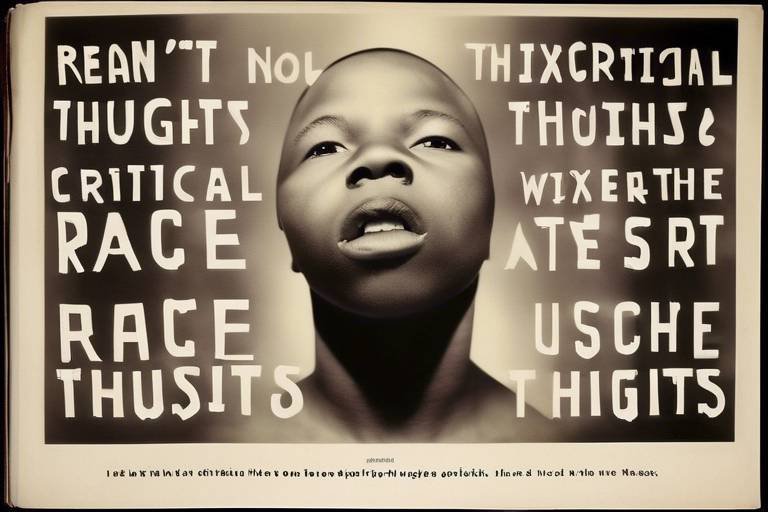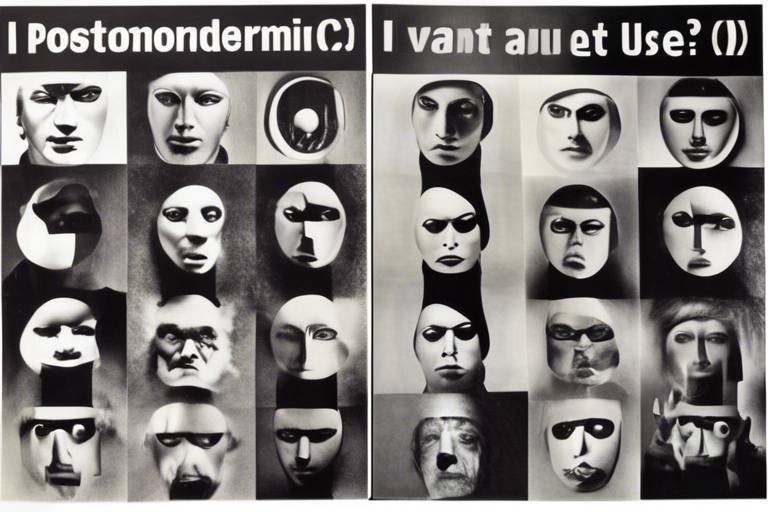Philosophy of Education - A Comprehensive Review
The philosophy of education serves as the backbone of teaching and learning, influencing how educators approach their roles and how students engage with knowledge. It's not just about the content delivered in classrooms; it encompasses the values, beliefs, and principles that guide educational systems. As we delve into this rich field, we will uncover the various philosophical frameworks that shape educational practices, theories, and policies. From the ancient wisdom of Socrates to the modern insights of John Dewey and Paulo Freire, the evolution of educational philosophy is a fascinating journey that intertwines with historical context and contemporary relevance.
The roots of educational philosophy stretch back through the ages, intertwining with significant movements that have shaped how we view teaching and learning today. The ancient Greeks, particularly Socrates, introduced the method of questioning, known as Socratic questioning, which encourages critical thinking and dialogue. Fast forward to the Enlightenment, where thinkers like John Locke and Jean-Jacques Rousseau emphasized the importance of reason and individual experience in learning. Their ideas laid the groundwork for modern educational theories, advocating for a more student-centered approach that values the learner's voice and experience.
As we look at the landscape of educational philosophy, several key figures stand out for their transformative ideas. John Dewey, a proponent of pragmatism, introduced the concept of experiential learning, emphasizing that education should be rooted in real-life experiences. Meanwhile, Paulo Freire challenged traditional power dynamics in the classroom through his critical pedagogy, advocating for dialogue and social justice. Finally, Maria Montessori revolutionized early childhood education with her child-centered approach, focusing on the natural development of children. Each of these philosophers has left an indelible mark on educational practices, shaping how we think about teaching and learning today.
Dewey's philosophy centers around the idea that learning is not a passive absorption of information but an active process of engaging with the world. His concept of experiential learning suggests that students learn best when they are involved in hands-on activities that relate to real-world situations. This approach has profound implications for teaching methods and curriculum design, pushing educators to create learning environments that foster critical thinking and problem-solving skills. Imagine a classroom where students are not just memorizing facts but are actively participating in projects that challenge them to think critically and collaborate with their peers.
Implementing experiential learning in the classroom can take many forms. Educators can design hands-on projects that allow students to apply their knowledge in practical contexts. For example, a science class might involve students conducting experiments, while a history class could include role-playing historical events. Additionally, real-world problem-solving activities can help students connect classroom learning with their lives outside of school. Collaborative learning experiences, such as group projects or community service, further enhance this approach by encouraging students to work together and learn from one another.
Reflection is a critical component of the learning process, allowing students to connect theory with practice. When students take the time to think about what they have learned, they deepen their understanding and develop their critical thinking skills. This reflective practice can take many forms, such as journaling, group discussions, or individual presentations. By encouraging students to reflect on their experiences, educators help them to internalize their learning and apply it in new and diverse contexts.
Freire's critical pedagogy emphasizes the importance of dialogue in education, viewing it as a means of empowering students. He believed that education should challenge traditional power dynamics, fostering a sense of agency among learners. By promoting social justice and encouraging students to question the status quo, Freire's approach has significant implications for contemporary education. In a world where inequalities persist, Freire's ideas remind us of the vital role that education plays in shaping a more equitable society.
As we navigate the complexities of modern education, various contemporary philosophies continue to influence teaching and learning. Among these, constructivism, essentialism, and progressivism stand out. Each philosophy brings its own set of principles and practical applications, responding to the diverse needs of today's learners. For instance, constructivism emphasizes student-centered learning, where learners actively construct knowledge through experiences. In contrast, essentialism focuses on a structured curriculum that prioritizes core knowledge and skills, preparing students for both academic and life challenges.
Constructivism reshapes the learning landscape by placing students at the center of their educational journeys. In constructivist classrooms, learners are encouraged to explore, ask questions, and collaborate with their peers. This approach not only fosters a deeper understanding of content but also promotes critical thinking and problem-solving skills. Imagine a classroom buzzing with energy, where students are engaged in discussions, sharing ideas, and building knowledge together.
Essentialism advocates for a curriculum that focuses on essential knowledge and skills. This philosophy emphasizes the importance of a structured educational framework that prepares students for real-world challenges. By prioritizing core subjects like mathematics, science, and literature, essentialism aims to equip students with the foundational skills necessary for success in their academic and professional lives.
- What is the philosophy of education? The philosophy of education encompasses the beliefs and principles that guide educational practices and theories.
- Who are some key figures in educational philosophy? Notable philosophers include John Dewey, Paulo Freire, and Maria Montessori.
- What is experiential learning? Experiential learning is an approach that emphasizes learning through experience and active engagement.
- How does critical pedagogy differ from traditional education? Critical pedagogy challenges power dynamics and promotes dialogue and social justice, unlike traditional education which often follows a top-down approach.

Historical Foundations of Educational Philosophy
The are rich and varied, tracing back to ancient civilizations and evolving through significant cultural and intellectual movements. One of the earliest influences can be found in the teachings of Socrates, who emphasized the importance of questioning and dialogue in the learning process. His method, known as the Socratic method, encourages students to engage in critical thinking through probing questions, fostering a deeper understanding of complex ideas. This approach laid the groundwork for future educational philosophies that prioritize inquiry and reflection.
Moving forward in history, the Enlightenment period brought about a wave of rational thought that profoundly impacted educational practices. Thinkers such as John Locke and Jean-Jacques Rousseau championed the idea that education should be rooted in reason and empirical evidence. Locke's notion of the mind as a "tabula rasa," or blank slate, suggested that experiences shape knowledge, while Rousseau's emphasis on natural education advocated for learning through experience rather than rote memorization. These ideas challenged traditional educational norms and paved the way for more progressive approaches to teaching and learning.
Throughout the 19th and 20th centuries, the landscape of educational philosophy continued to evolve, influenced by various movements and key figures. The rise of progressivism, spearheaded by thinkers like John Dewey, emphasized the importance of experiential learning and the need for education to be relevant to students' lives. Dewey argued that education should not merely prepare students for the future but also engage them in the present, fostering a sense of community and social responsibility.
To further illustrate the historical evolution of educational philosophy, consider the following table that highlights key movements and their central ideas:
| Movement | Key Thinkers | Core Ideas |
|---|---|---|
| Socratic Method | Socrates | Inquiry-based learning through dialogue |
| Empiricism | John Locke, John Stuart Mill | Knowledge is derived from sensory experience |
| Romanticism | Jean-Jacques Rousseau | Natural education and learning through experience |
| Progressivism | John Dewey | Education as a means for social reform and democracy |
As we delve deeper into the 21st century, the relevance of these historical foundations becomes increasingly apparent. Today’s educational practices are often a blend of these philosophies, reflecting a rich tapestry of ideas that continue to inform how we teach and learn. The ongoing dialogue between these historical perspectives and contemporary educational challenges highlights the dynamic nature of educational philosophy, ensuring that it remains a vital area of inquiry and development.
In conclusion, understanding the provides valuable insights into the principles that guide modern education. By examining the contributions of key thinkers and movements, we can appreciate the evolution of educational thought and its significance in shaping our current learning environments.
- What is the Socratic method? - The Socratic method is a form of cooperative argumentative dialogue that stimulates critical thinking, often involving asking and answering questions to stimulate deeper thought.
- How did Enlightenment thinkers influence education? - Enlightenment thinkers emphasized reason, individualism, and empirical evidence, leading to educational practices that focused on critical thinking and experiential learning.
- Who is John Dewey and what is his contribution to education? - John Dewey was an American philosopher and educator who advocated for progressive education, emphasizing experiential learning and the importance of community in the educational process.

Key Philosophers and Their Contributions
When we dive into the world of educational philosophy, we encounter a rich tapestry woven by the thoughts and ideas of several key figures. Each philosopher has contributed uniquely to the way we understand and implement education today. Let's take a closer look at some of these influential thinkers and the legacies they’ve left behind.
John Dewey, a prominent figure in the field of education, is best known for his advocacy of experiential learning. He believed that education should not merely be about rote memorization but rather about engaging students in real-world experiences that stimulate critical thinking. Dewey argued that learning should be a dynamic process, where students actively participate in their own education rather than passively receiving information. This approach has led to innovative teaching methods that emphasize hands-on learning and collaboration among students.
Another giant in the realm of educational philosophy is Paulo Freire. His work is centered around the concept of critical pedagogy, which challenges the traditional teacher-student hierarchy. Freire emphasized the importance of dialogue and empowerment in the classroom, advocating for an educational experience that promotes social justice. He believed that education should be a liberating force, enabling students to question and transform their realities. This philosophy has inspired countless educators to rethink their roles and the dynamics of their classrooms.
Maria Montessori also made significant contributions to educational theory with her innovative approach to child-centered learning. The Montessori Method emphasizes independence, respect for a child’s natural psychological development, and the importance of a prepared environment. Montessori classrooms are designed to encourage exploration and discovery, allowing children to learn at their own pace. This method has gained international acclaim and continues to influence educational practices worldwide.
These philosophers, among others, have laid the groundwork for modern educational practices. Their ideas resonate in today’s classrooms, where the focus is increasingly on fostering critical thinking, dialogue, and student agency. The impact of their contributions can be seen in various educational frameworks that prioritize not just academic success but also social and emotional development.
To summarize the contributions of these key philosophers, we can look at the following table:
| Philosopher | Main Contribution | Key Concepts |
|---|---|---|
| John Dewey | Experiential Learning | Active participation, critical thinking |
| Paulo Freire | Critical Pedagogy | Dialogue, empowerment, social justice |
| Maria Montessori | Child-Centered Learning | Independence, prepared environment |
As we reflect on the contributions of these philosophers, it becomes clear that their ideas are not just historical footnotes; they are living concepts that continue to shape educational practices today. By integrating their philosophies into contemporary teaching methods, educators can create more engaging, inclusive, and effective learning environments.
- What is the significance of educational philosophy? Educational philosophy provides a framework for understanding the purpose and methods of education, guiding educators in their teaching practices.
- How can I apply these philosophical ideas in my classroom? You can incorporate these ideas by fostering student engagement, encouraging critical thinking, and creating a collaborative learning environment.
- Are there modern philosophers influencing education today? Yes, contemporary thinkers continue to build on the foundations laid by historical philosophers, addressing current educational challenges and innovations.

John Dewey's Pragmatism
John Dewey, a prominent figure in the realm of educational philosophy, championed the idea of pragmatism, which emphasizes the significance of experience in the learning process. Dewey believed that education should not merely be about rote memorization or passive absorption of information; rather, it should engage students actively, allowing them to explore, question, and reflect on their learning. This approach is often encapsulated in the term experiential learning, which asserts that knowledge is best acquired through direct interaction with the world.
One of Dewey's key contributions was his assertion that learning is a social process. He argued that education should foster collaboration and communication among students, enabling them to learn from one another. This perspective is vital in today’s classrooms, where diverse groups of students bring unique experiences and viewpoints. By encouraging dialogue and teamwork, educators can create a rich learning environment that mirrors real-world interactions.
Moreover, Dewey posited that education should be a dynamic process that adapts to the needs of students and society. He believed that the curriculum should not be static but should evolve based on the interests and experiences of learners. This adaptability ensures that education remains relevant and meaningful, preparing students to navigate the complexities of modern life.
To illustrate Dewey's ideas in practice, consider the following elements of his educational philosophy:
- Hands-On Learning: Dewey advocated for activities that allow students to engage directly with materials and concepts, such as science experiments or art projects.
- Real-World Problem Solving: Students should tackle real issues, encouraging them to think critically and apply their knowledge in practical scenarios.
- Collaborative Learning: Group projects and discussions enable students to learn from each other, fostering a sense of community and shared purpose.
Incorporating these principles into classroom practices not only enhances student engagement but also cultivates essential skills such as critical thinking, creativity, and teamwork. As Dewey famously stated, “If we teach today’s students as we taught yesterday’s, we rob them of tomorrow.” This quote encapsulates the urgency of adapting educational practices to meet the needs of a rapidly changing world.
Reflection also plays a crucial role in Dewey's philosophy. He emphasized that students should take time to think about their experiences, drawing connections between theory and practice. By reflecting on what they have learned, students deepen their understanding and develop a more nuanced perspective on the subject matter. This process of reflection can be structured through guided questions, journals, or group discussions, allowing learners to articulate their thoughts and insights.
In conclusion, John Dewey's pragmatism offers a robust framework for modern education. By prioritizing experiential learning, collaboration, and reflection, educators can create environments that not only impart knowledge but also prepare students to be active, engaged citizens in a diverse and dynamic world.
1. What is John Dewey's main contribution to education?
Dewey's main contribution is the concept of experiential learning, which emphasizes learning through experience and reflection rather than passive absorption of information.
2. How can teachers implement Dewey's ideas in the classroom?
Teachers can implement Dewey's ideas by incorporating hands-on projects, fostering collaborative learning experiences, and encouraging students to reflect on their learning.
3. Why is reflection important in Dewey's educational philosophy?
Reflection is crucial as it helps students connect theory to practice, deepening their understanding and promoting critical thinking skills.

Experiential Learning in Practice
Experiential learning is more than just a buzzword in the educational landscape; it’s a transformative approach that reshapes how students engage with knowledge. Imagine a classroom where students are not merely passive recipients of information but are actively involved in their own learning journey. This is the essence of experiential learning, where the classroom spills out into the real world, allowing students to connect theory with practice. Think of it as a bridge that links academic concepts to tangible experiences, creating a rich tapestry of understanding.
One of the most effective ways to implement experiential learning is through hands-on projects. These projects encourage students to roll up their sleeves and dive into the material. For instance, instead of just reading about ecosystems in a textbook, students could create a small garden or participate in a local environmental cleanup. This not only solidifies their understanding of ecological concepts but also fosters a sense of responsibility towards their community and the environment.
Moreover, real-world problem-solving is another key component of experiential learning. Imagine students tackling a community issue, like food scarcity. They could research local resources, interview stakeholders, and devise a plan to address the problem. This approach not only equips them with critical thinking skills but also empowers them to make a difference in their surroundings. By engaging with real-life challenges, students learn to navigate complexities, think critically, and work collaboratively—all essential skills in today’s world.
Collaboration is at the heart of experiential learning. When students work together on projects, they learn from each other’s perspectives and experiences. This collaborative spirit can be nurtured through group activities, such as science fairs or community service projects, where students can share responsibilities and outcomes. The synergy created in these settings often leads to deeper insights and a more profound understanding of the subject matter.
However, the magic of experiential learning doesn’t stop at just doing; it also involves reflection. After engaging in these hands-on experiences, it’s crucial for students to take a step back and reflect on what they’ve learned. Reflection helps them connect the dots between theory and practice, allowing them to internalize their experiences. Teachers can facilitate this reflection through guided discussions, journals, or presentations, prompting students to consider questions like: “What did I learn?” or “How can I apply this knowledge in the future?”
In conclusion, experiential learning is a dynamic approach that breathes life into education. By incorporating hands-on projects, real-world problem-solving, and collaborative activities, educators can create an environment where students thrive. This method not only enhances their understanding of academic concepts but also prepares them for the complexities of life beyond school. As we move forward, it’s essential to embrace these practices, ensuring that education is not just about memorizing facts but about building a foundation for lifelong learning.
- What is experiential learning? Experiential learning is a hands-on approach to education that emphasizes learning through experience, allowing students to engage actively with the material.
- How can teachers implement experiential learning in their classrooms? Teachers can implement experiential learning through hands-on projects, real-world problem-solving activities, and collaborative learning experiences.
- Why is reflection important in experiential learning? Reflection is crucial as it helps students connect their experiences with theoretical knowledge, enhancing their understanding and retention of the material.
- What are some examples of experiential learning activities? Examples include community service projects, internships, simulations, and field trips that allow students to apply their learning in real-world contexts.

The Role of Reflection
Reflection plays a pivotal role in the learning process, acting as a bridge that connects theory with practice. Imagine you're a sailor navigating through uncharted waters; without reflection, you may find yourself lost, unable to chart a course based on past experiences. In education, this reflection allows students to pause and consider what they have learned, how they have learned it, and the implications of their newfound knowledge. It's not just about memorizing facts but understanding the 'why' and 'how' behind them.
When students engage in reflective practices, they cultivate a deeper understanding of the material. This process often involves asking critical questions such as:
- What did I learn today?
- How does this connect to what I already know?
- What challenges did I face, and how did I overcome them?
- How can I apply this knowledge in the real world?
These questions prompt students to think critically, fostering a mindset that values inquiry and exploration. Reflection encourages learners to take ownership of their educational journey, transforming passive reception into active engagement. By regularly reflecting on their learning experiences, students can identify patterns, recognize their strengths and weaknesses, and set goals for future learning.
Moreover, reflection is not a solitary activity; it can be enhanced through collaborative discussions with peers. Group reflections often lead to richer insights as students share diverse perspectives and experiences. This social aspect of reflection helps to build a community of learners who support and challenge each other, promoting a culture of continuous improvement.
Incorporating reflection into the classroom can take various forms, such as:
- Journals or learning logs where students document their thoughts and feelings about their learning experiences.
- Group discussions that allow students to articulate their reflections and learn from one another.
- Feedback sessions where students receive constructive criticism and reflect on their progress.
Ultimately, reflection is not just a tool for academic growth; it fosters emotional intelligence and self-awareness. As students learn to reflect on their experiences, they also develop skills that are essential for personal and professional success. They become more adaptable, resilient, and prepared to face the complexities of the world beyond the classroom.
- Why is reflection important in education? Reflection helps students make connections between their learning and real-life applications, enhancing their understanding and retention of knowledge.
- How can teachers encourage reflection in the classroom? Teachers can implement reflective practices through journaling, group discussions, and feedback sessions, creating a safe space for students to share their thoughts.
- What are some effective reflection techniques? Techniques include self-assessment, peer feedback, and guided reflection prompts that encourage critical thinking.
- Can reflection improve student engagement? Yes, by allowing students to take ownership of their learning, reflection can lead to increased motivation and engagement.

Paulo Freire's Critical Pedagogy
When we think about education, it's easy to imagine a traditional classroom filled with desks, a teacher at the front, and students quietly taking notes. But what if I told you that there’s a revolutionary approach to learning that flips this model on its head? Enter , a philosophy that champions dialogue, empowerment, and social justice in education. Freire believed that education should be a collaborative process, where both teachers and students engage in a meaningful exchange of ideas.
Freire's approach is deeply rooted in the idea of dialogue. He argued that learning should not be a one-way street where information is simply deposited into the minds of students, a method he famously critiqued as the "banking model" of education. Instead, he envisioned classrooms as spaces for critical reflection and active participation. In his view, the act of teaching and learning should be a democratic process, where everyone’s voice is valued and respected. This is particularly important in diverse classrooms where students come from various backgrounds and experiences.
One of the cornerstones of Freire's philosophy is the idea of conscientization, or the process of developing a critical awareness of one’s social reality through reflection and action. He believed that education should empower students to question the world around them, recognize inequalities, and take action to change their circumstances. This transformative approach not only equips learners with knowledge but also instills a sense of social responsibility. Freire's pedagogy encourages students to become agents of change, rather than passive recipients of information.
In practical terms, how does Freire's critical pedagogy manifest in the classroom? Here are some key principles:
- Dialogue Over Monologue: Teachers facilitate discussions rather than lecture, allowing students to express their thoughts and feelings.
- Real-World Context: Lessons connect to students' lives and experiences, making learning relevant and engaging.
- Collaborative Learning: Students work together to solve problems, fostering a sense of community and shared responsibility.
- Critical Thinking: Students are encouraged to question assumptions and analyze information critically.
Freire's work has had a profound impact on educational practices around the globe. His ideas have inspired educators to rethink how they approach teaching, especially in marginalized communities where traditional methods may not resonate. By focusing on empowerment and social justice, Freire's critical pedagogy aims to create a more equitable and inclusive educational landscape.
In summary, Paulo Freire's critical pedagogy is not just a teaching method; it's a philosophy that seeks to transform education into a vehicle for social change. By fostering dialogue, encouraging critical thinking, and empowering students, Freire's ideas continue to resonate in contemporary education, reminding us that learning is a collaborative journey, not a solitary endeavor.
- What is critical pedagogy? Critical pedagogy is an educational approach that emphasizes dialogue, critical thinking, and social justice, encouraging students to question and challenge societal norms.
- Who is Paulo Freire? Paulo Freire was a Brazilian educator and philosopher known for his influential work in critical pedagogy and his advocacy for social justice in education.
- How can I implement Freire's ideas in my classroom? You can implement Freire's ideas by fostering open dialogue, connecting lessons to real-world experiences, and encouraging students to collaborate and think critically.

Contemporary Educational Philosophies
In today’s ever-evolving educational landscape, a variety of contemporary educational philosophies have emerged, each offering unique perspectives on how we approach teaching and learning. These philosophies are not just abstract ideas; they are practical frameworks that influence how educators design curricula, engage with students, and assess learning outcomes. Understanding these philosophies can help educators adapt to the diverse needs of their students, ensuring that the educational experience is both enriching and relevant.
One of the most significant contemporary philosophies is constructivism. This approach emphasizes the idea that learners actively construct their own understanding and knowledge of the world, rather than passively receiving information. In a constructivist classroom, students are encouraged to explore, ask questions, and engage in hands-on activities that promote deep learning. For instance, rather than simply memorizing facts, students might work on projects that require them to apply their knowledge to real-world situations. This not only fosters critical thinking but also encourages collaboration among peers, as they share ideas and solve problems together.
Another important philosophy is essentialism, which focuses on the core knowledge and skills that students need to succeed in life. Essentialists advocate for a structured curriculum that prioritizes foundational subjects such as mathematics, science, and literature. The rationale behind this philosophy is that a solid grounding in these areas equips students with the tools necessary to navigate both academic and everyday challenges. In practice, essentialism can lead to a more disciplined approach to education, where students are held accountable for mastering essential content before moving on to more complex topics.
In contrast to essentialism, progressivism promotes a more flexible and student-centered approach. Progressivist educators believe that education should be relevant to students' lives and interests, encouraging them to engage with their community and the world around them. This philosophy often incorporates project-based learning and experiential activities, allowing students to learn through direct experience. For example, a progressivist classroom might involve students working on community service projects, thereby developing not only academic skills but also social awareness and responsibility.
These philosophies are not mutually exclusive; in fact, many educators blend elements from multiple frameworks to create a more holistic learning environment. For instance, a teacher might employ constructivist strategies to encourage student engagement while also integrating essentialist principles to ensure that critical knowledge is not overlooked. The key is to remain adaptable and responsive to the needs of students, recognizing that each learner is unique and may thrive under different educational approaches.
As we look to the future, the integration of technology in education is also shaping contemporary philosophies. Online learning platforms, interactive tools, and digital resources provide new avenues for students to explore and engage with content. This technological shift necessitates a re-evaluation of traditional educational practices, prompting educators to consider how best to leverage these tools to enhance learning experiences.
In summary, contemporary educational philosophies such as constructivism, essentialism, and progressivism offer valuable insights into how we can better meet the needs of students in a diverse and dynamic world. By understanding and applying these philosophies, educators can create engaging, meaningful, and effective learning environments that prepare students for the challenges of tomorrow.
- What is the main focus of constructivism? Constructivism emphasizes active learning, where students construct their own understanding through experiences and collaboration.
- How does essentialism differ from progressivism? Essentialism focuses on core knowledge and skills, while progressivism promotes a flexible, student-centered approach that connects learning to real-life experiences.
- Can educators combine different educational philosophies? Yes, many educators blend elements from various philosophies to create a more comprehensive and adaptable learning environment.

Constructivism and Learning
Constructivism is not just a buzzword in educational circles; it's a revolutionary approach that fundamentally reshapes how we think about learning. Imagine a classroom where students are not merely passive recipients of information but active participants in their own learning journeys. This is the essence of constructivism. It emphasizes that learners construct their own understanding and knowledge of the world through experiences and reflecting on those experiences. Rather than memorizing facts, students engage deeply with content, exploring, questioning, and discovering, much like a detective solving a mystery.
One of the core principles of constructivism is that learning is inherently social. It thrives in environments that encourage collaboration and interaction among learners. Think of it as a vibrant marketplace of ideas where students share perspectives, challenge each other’s thinking, and build upon one another's insights. This collaborative spirit not only enhances understanding but also fosters essential skills like communication and teamwork, which are invaluable in today’s interconnected world.
In a constructivist classroom, the teacher's role shifts from being the primary source of knowledge to a facilitator or guide. This means that instead of delivering lectures, teachers create rich, engaging learning experiences that encourage exploration and inquiry. For instance, students might work on hands-on projects where they apply theoretical concepts to real-world problems. This approach not only makes learning more relevant but also ignites a sense of curiosity and motivation among students.
Consider a science class where students are tasked with designing an experiment to test the effects of sunlight on plant growth. Instead of simply reading about photosynthesis, they actively engage with the material, hypothesizing, testing, and reflecting on their findings. This experiential learning process is at the heart of constructivism, allowing students to connect theoretical knowledge with practical application.
Another vital aspect of constructivism is the role of reflection. Reflection encourages students to think critically about their learning experiences, helping them to make connections between theory and practice. For example, after completing a project, students might engage in a reflective discussion or write a journal entry about what they learned, the challenges they faced, and how they overcame them. This not only solidifies their understanding but also promotes metacognition, enabling learners to become more aware of their own learning processes.
In summary, constructivism transforms the educational landscape by fostering environments where students are empowered to take charge of their own learning. By emphasizing collaboration, experiential learning, and reflection, constructivist approaches not only enhance knowledge retention but also prepare students for the complexities of the real world. As we continue to evolve in our educational practices, embracing the principles of constructivism could be the key to unlocking the full potential of our learners.
- What is constructivism? Constructivism is an educational philosophy that posits learners construct their own understanding and knowledge through experiences and reflection.
- How does constructivism differ from traditional education? Unlike traditional education, which often emphasizes rote memorization and passive learning, constructivism promotes active engagement and collaboration among students.
- What role do teachers play in a constructivist classroom? Teachers act as facilitators, guiding students through learning experiences rather than simply delivering information.
- How can reflection be incorporated into constructivist learning? Reflection can be encouraged through discussions, journal writing, or self-assessment activities that help students think critically about their learning experiences.

Essentialism in Curriculum Design
Essentialism in curriculum design is a philosophy that emphasizes the teaching of core knowledge and skills that are deemed essential for students to become competent and productive members of society. This approach is rooted in the belief that there are fundamental principles and truths that should be imparted to all students, regardless of their background or individual interests. The essentialist curriculum is structured and systematic, focusing on a well-defined body of knowledge that prepares students for both academic success and real-world challenges.
At its core, essentialism advocates for a back-to-basics approach, prioritizing subjects such as mathematics, science, history, and literature. By concentrating on these foundational areas, essentialism aims to cultivate critical thinking, effective communication, and problem-solving skills among students. This educational philosophy is particularly relevant in today’s fast-paced and ever-evolving world, where a strong grasp of essential knowledge can provide students with the tools they need to navigate complex situations.
One of the key benefits of an essentialist curriculum is its potential to create a cohesive educational experience. By establishing a clear set of goals and standards, educators can ensure that all students receive a consistent and comprehensive education. This structure not only facilitates learning but also helps students develop a sense of responsibility for their own education. Moreover, essentialism encourages teachers to take on the role of facilitators, guiding students through the learning process while holding them accountable for their progress.
However, critics of essentialism argue that this rigid focus on core knowledge can stifle creativity and limit students' ability to explore their interests. They contend that education should also foster personal growth and encourage students to think outside the box. In response, essentialists maintain that a strong foundation in essential subjects provides the necessary framework for students to later pursue their passions and interests more effectively.
To illustrate the principles of essentialism in practice, consider the following key components of an essentialist curriculum:
| Component | Description |
|---|---|
| Core Subjects | Focus on fundamental areas such as mathematics, science, literature, and history. |
| Structured Learning | Implementation of a systematic approach to teaching that emphasizes mastery of essential knowledge. |
| Teacher's Role | Teachers act as facilitators, guiding students while holding them accountable for their learning. |
| Assessment | Regular evaluations to ensure students are mastering core content and skills. |
In conclusion, essentialism in curriculum design serves as a vital framework for educators aiming to equip students with the essential knowledge and skills they need to thrive. While it may not be without its criticisms, the emphasis on core subjects and structured learning can provide students with a solid foundation for future success. As we continue to navigate the complexities of modern education, the principles of essentialism remain a significant consideration for educators seeking to balance foundational knowledge with the diverse needs of their students.
- What is essentialism in education? Essentialism is an educational philosophy that emphasizes teaching core knowledge and skills necessary for students to succeed in society.
- How does essentialism differ from progressivism? While essentialism focuses on a structured curriculum of core subjects, progressivism emphasizes experiential learning and student interests.
- Can essentialism foster creativity? Critics argue it may limit creativity, but proponents believe a strong foundation in essential subjects can enhance creative problem-solving skills.
- What subjects are typically included in an essentialist curriculum? Core subjects usually include mathematics, science, literature, and history.
Frequently Asked Questions
- What is the philosophy of education?
The philosophy of education is a branch of philosophy that examines the fundamental nature and aims of education. It explores various philosophical frameworks that shape educational practices, theories, and policies, providing insights into how we can improve learning environments.
- Who are some key philosophers in education?
Some prominent philosophers include John Dewey, Paulo Freire, and Maria Montessori. Each of them has made significant contributions to educational theory, focusing on experiential learning, critical pedagogy, and child-centered education, respectively.
- What is John Dewey's concept of experiential learning?
John Dewey's concept of experiential learning emphasizes the importance of learning through experience. It advocates for hands-on projects and real-world problem-solving, allowing students to engage actively with their learning, which enhances critical thinking skills.
- How can experiential learning be implemented in classrooms?
Experiential learning can be implemented through collaborative projects, simulations, and field trips. These methods encourage students to apply their knowledge in practical situations, fostering deeper understanding and retention of concepts.
- What is Paulo Freire's critical pedagogy?
Paulo Freire's critical pedagogy is an educational approach that emphasizes dialogue, empowerment, and social justice. It challenges traditional power dynamics in the classroom, encouraging students to question and transform their societal conditions.
- What are contemporary educational philosophies?
Contemporary educational philosophies include constructivism, essentialism, and progressivism. Each philosophy has its principles and practical applications, shaping how education is delivered in diverse settings today.
- How does constructivism impact learning?
Constructivism promotes student-centered learning by encouraging learners to actively construct knowledge through experiences and collaboration with peers. This approach fosters critical thinking and problem-solving skills, making learning more engaging and meaningful.
- What is essentialism in education?
Essentialism focuses on a structured curriculum that emphasizes core knowledge and skills essential for student success. It aims to prepare students for academic challenges and life beyond school by providing a solid foundation in key subjects.



















